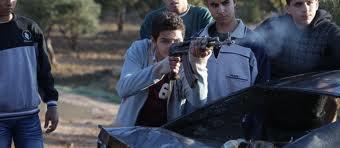Dir: Yuval Adler. Israel-Belgium-Germany. 2013. 99mins

The uncanny similarity between the story lines of Yuval Adler’s debut feature and Hani Abu Assad’s Omar, unveiled earlier this year in Cannes, is bound to raise quite a few eyebrows among the followers of the Middle East conflict representation in movies. Using an almost identical plot, but developing its details from different angles, the two films conclude on the same despairing note, underlining once again the hopelessness of the confrontation they deal with.
Shot and cut with surprising perspicacity for a first film, Adler’s film races on, deftly avoiding any political issues that may unsettle its straightforward course.
In both films, a Shin Beth (Israel’s version of the FBI) officer tries to use a young Palestinian in order to capture a relative suspected of terrorist activities. While Abu-Assad, naturally, chooses to look at the story from a Palestinian point of view and stresses the conditions imposed by occupation on the West Bank population, which are at the heart of the conflict, Adler’s much slicker take looks like a politically correct, action-driven movie, which could efficiently portray the dramatic clashes inside any national security agency, wherever it may be, struggling to maintain law and order against rebellious factions fighting them.
Adopting the perspective of the Israeli agency attempting to penetrate the Palestinian resistance movement in order to prevent further suicide bombings taking place under their nose, Adler’s script (co-written with Ali Vackad), forces Razi (Tzachi Halevy), a Secret Service officer, to face his own personal duplicity when he pressures a Palestinian adolescent, Sanfur (Shhadi Maryee) to cooperate with him, manipulating the boy into situations where he has no choice but to unconsciously comply with the demands made on him and betray his own people.
The main object of Razi’s operation is to capture Sanfur’s older brother, Ibrahim (Hisham Suleiman), the mastermind behind a series of deadly assaults on Israeli cities.
Adler’s smooth, fast paced, smart approach - no doubt the result of his American filmmaking training - offers, under the guise of a thriller, a morality tale strewn with victims but without any outright heroes or villains, though its distinct sympathies are in evidence all through.
The Israeli Internal Security is packed with tough, ruthless, often unpleasant types, but that’s par for the course in the circumstances. Nice people don’t win wars. As for Razi , his moral standards are dubious at best, but he certainly has a soft, almost paternal, spot for Sanfur, and while he accepts the notion that he exploits him as his own personal tool, he nevertheless refuses to sacrifice him, despite the insistence of his superiors.
Abu-Assad’s Omar doesn’t forget to mention the internal strife inside the Palestinian camp while Adler expounds in far more detail the clashes between various sections of the Arab armed militias, painting at the same time a less than flattering portrait of their legitimate political leaders.
One particularly disturbing scene shows two paramilitary factions fighting at gunpoint over the dead body of Ibrahim, each claiming he was their own Shahid (martyr) and no one else’s. Whether that kind of incident is true or not, having an Israeli director put it on the screen will not garner universal approval.
Shot and cut with surprising perspicacity for a first film, Adler’s film races on, deftly avoiding any political issues that may unsettle its straightforward course. A typecast ensemble fits easily into the puzzle, whether it is Maryee’s constantly angry stance hiding Sanfur’s immaturity and confusion; Halevy’s likeable personality that tends to prevent the audience from being entirely put off by his acts, or Hitham Omari’s Badawi, the man who takes over the late Ibrahim’s position, an actor whose sculpted face and confident demeanor will not easily be forgotten.
As for the question is Bethlehem better than Omar or the other way around, it all depends on the beholder’s point of view. The first is more user-friendly, the second more political…the first believes suicide bombers are terrorists to be stopped at any price including one’s conscience, the second that they are freedom fighters who may be wrong in their acts but have no other choice.
Production companies: Pie Film, Gringo Flms, Entre Chien et Loup
Producers: Osnat Handelsman-Keren, Talia Kleinhendler, Sebastien Delloye, Diana Elbaum, Steve Hudson, Sonja Ewers
International Sales: West End Films, www.westendfilms.com
Screenplay: Yuval Adler, Ali Vackad
Cinematography: Yaron Scharf
Editor: Ron Omer
Production design: Yoav Sinai
Music: Ishai Adar
Main cast: Tzahi Halevy, Yossi Einy, George Iskander, Tarik Kopty, Shhadi Maryee,Dudu Niv, Hitham Omari, Irad Rubenstein, Ibarahim Saqallah, Karem Shakur





















